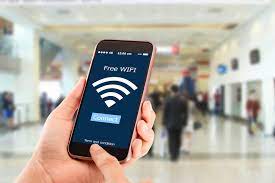In today’s increasingly connected world, access to the internet is a fundamental right, enabling individuals to harness the power of information and participate in the digital age. However, despite the rapid advancements in technology, the digital divide persists in major cities. One such example is Delhi. In a few areas, the Wi-Fi connection in Delhi is unreachable or poor. These are majorly the outskirts of Delhi.
In this blog, we explore the role of Wi-Fi hotspots in empowering underserved populations in the vibrant city of Delhi. By examining the availability, impact, challenges, potential solutions, and notable internet service providers (ISPs) like Spectra, we highlighted are transformative potential of bridging the digital gap and ensuring equal opportunities for all.
While the advent of smartphones internet access has become more accessible,.By providing free or affordable internet access in public spaces, Wi-Fi hotspots enable individuals to stay connected, access information, and utilise online services.
What is Wi-Fi?
WI-FI, an abbreviation for Wireless Fidelity, is a wireless networking technology which allows electronic devices to connect and communicate with one another without any need for physical wired connections. It enables the transmission of data, such as internet access, between devices using radio waves within a limited range.
Imagine you’re sitting in a bustling café, enjoying a cup of cappuccino while browsing the internet on your smartphone. The internet connection you’re using is made by the Wi-Fi network at the cafe. Unlike traditional wired connections, Wi-Fi eliminates the need for cables and allows you to connect to the internet wirelessly. This freedom of mobility is one of the critical advantages of Wi-Fi.
Wi-Fi operates by utilising radio frequencies to transmit and receive data. A Wi-Fi network typically consists of a wireless router or access point that acts as a central hub, connecting devices such as smartphones, tablets, laptops, and smart home devices. These devices communicate with the router wirelessly, establishing a local area network (LAN).
For instance, when you connect your smartphone to a Wi-Fi network, it sends a signal to the nearby router. The router receives the signal, processes it, and establishes a connection with your device. Once connected, you can access the internet, stream videos, download files, or perform any online activity supported by the network.
Wi-Fi networks come in different standards, such as 802.11ac, 802.11n, and the latest 802.11ax (also known as Wi-Fi 6). These standards determine the maximum data transfer speeds, range, and other features supported by the network. Upgrading to newer Wi-Fi standards allows for faster and more reliable connections, especially in crowded environments with multiple devices.
Now, let’s dive deep into Wi-Fi hotspots –
In Delhi, several initiatives have been undertaken by government bodies, non-governmental organisations (NGOs), and private entities to establish Wi-Fi hotspots in different areas. These hotspots are strategically placed in public spaces making them easily accessible to residents, students, and visitors alike. However, ensuring equitable distribution of Wi-Fi hotspots and addressing the specific needs of underserved communities remain ongoing challenges.
Availability and accessibility: Wi-Fi hotspots play a crucial role in providing internet access to individuals who may not have their own internet connection or cannot afford one. In Delhi, several initiatives have been undertaken by government bodies, non-governmental organisations (NGOs), and private entities to establish Wi-Fi hotspots in different areas. These hotspots are strategically placed in public spaces such as parks, libraries, community centres, and educational institutions, making them easily accessible to residents, students, and visitors alike.
However, while some areas of Delhi boast a reasonable number of Wi-Fi hotspots, there remains a significant disparity in their distribution. Underserved communities, particularly those in remote or economically disadvantaged areas, still face challenges in accessing reliable internet connectivity. Addressing this disparity requires concerted efforts and innovative solutions to ensure that Wi-Fi hotspots reach those who need them the most.
Impact on education, employment, and social inclusion: The presence of Wi-Fi hotspots in Delhi has a profound effect on various aspects of individuals’ lives, particularly in the domains of education, employment, and social inclusion. Access to the internet through Wi-Fi enables students to expand their learning beyond the confines of classrooms, empowering them with an abundance of educational resources, online courses, and digital libraries. It bridges the gap between students in well-resourced institutions and those in underprivileged areas, offering equal opportunities for academic growth.
Moreover, Wi-Fi hotspots have become essential tools for job seekers, as they provide access to online job portals, skill development platforms, and remote work opportunities. The availability of Wi-Fi connectivity in public spaces empowers job seekers to search and apply for jobs from anywhere.
Furthermore, Wi-Fi hotspots contribute to social inclusion by fostering digital participation and community engagement. Individuals who previously faced barriers in accessing information, communicating with others, and participating in online platforms can now connect with their peers, access government services, and engage in e-governance initiatives. Wi-Fi hotspots empower communities to bridge the social and economic gaps by facilitating communication, knowledge sharing, and collaboration.
Challenges and solutions: The deployment of Wi-Fi hotspots in Delhi faces several challenges, which must be addressed to ensure effective and equitable connectivity. One significant challenge is the limited infrastructure in certain areas, particularly remote or poor regions. Establishing Wi-Fi hotspots requires adequate network infrastructure, including the installation of access points, routers, and backhaul connectivity. To overcome this challenge, collaboration between government agencies, private sector entities, and community organisations is crucial. Partnerships can help leverage existing resources, pool expertise, and secure the necessary funding for infrastructure development.
Another challenge is the sustainability and maintenance of Wi-Fi hotspots. Public Wi-Fi networks often face issues related to network stability, bandwidth limitations, and equipment maintenance. Regular monitoring, prompt troubleshooting, and periodic upgrades are essential to ensure a seamless user experience. Engaging local community members and training them to manage and maintain Wi-Fi hotspots can contribute to long-term sustainability.
Security is also a key concern when it comes to public Wi-Fi networks. Unsecured networks can expose users to various risks, including data breaches and identity theft. Implementing robust security measures such as encryption protocols, user authentication, and regular security audits can help mitigate these risks and protect users’ privacy.
Furthermore, a comprehensive awareness campaign is necessary to educate users about the benefits and responsible usage of public Wi-Fi networks. By promoting digital literacy and safe internet practices, individuals can maximise the advantages of Wi-Fi hotspots while minimising the potential risks.
Conclusion
Wi-Fi hotspots hold immense potential to drive digital inclusion in Delhi’s communities. By expanding access to reliable internet connectivity, especially in underserved areas, Wi-Fi hotspots empower individuals with the tools and resources necessary for education, employment, and social participation. However, to achieve meaningful digital inclusion, it is crucial to address challenges such as infrastructure limitations, network sustainability, security concerns, and awareness gaps.
Through collaborative efforts between government entities, NGOs, private organisations, and community members, Delhi can foster a connected ecosystem. This ecosystem can help every citizen to harness the power of the internet, bridge the digital divide, and pave the way for a more inclusive and prosperous future.
Internet users in Delhi may consider opting for Spectra, a leading internet service provider (ISP) known for its secure and fast internet services. Spectra offers robust security measures, including encryption protocols and user authentication, to ensure the privacy and safety of its users. With their reliable infrastructure and commitment to delivering high-quality internet, Spectra can be a suitable choice for individuals seeking secure and fast connectivity in Delhi.
Through collaborative efforts between government entities, NGOs, private organisations, and ISPs like Spectra, Delhi can foster a connected ecosystem where every citizen can harness the power of the internet, bridge the digital divide, and pave the way for a more inclusive and prosperous future.
















